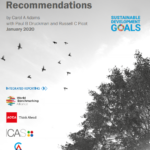
Social return on investment (SROI) is a methodology for calculating the monetary value of the impact made by a community programme. That value can include a wide variety of aspects, from the financial savings achieved for the government if someone finds work, to the value placed on an improvement in participants’ general wellbeing. SROI enables an organisation to compare the value of a programme’s outcomes with the money that was invested to achieve those outcomes.
Heidi Fisher is a former accountant and she now helps organisations measure and report on their social impact through the community interest company, Make an Impact. She has helped create Central England Co-operative’s first social impact report.
“Measuring your SROI tells you whether you’re achieving what you’re setting out to do,” she says. Heidi believes there are benefits to reporting separately: “For me, a CSR report is something a business does to say, ‘Hey, aren’t we good, this is all the stuff we do in the community.’ Whereas a social impact report, or a SROI report, is more about saying, ‘This is part of our day-to-day operations; making a difference in the community is at the core of who we are.’ You really need a balance between reporting on your financial performance and reporting on your social performance, otherwise you’re not really telling the full story.”



